


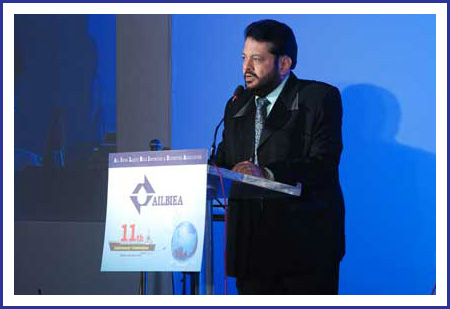

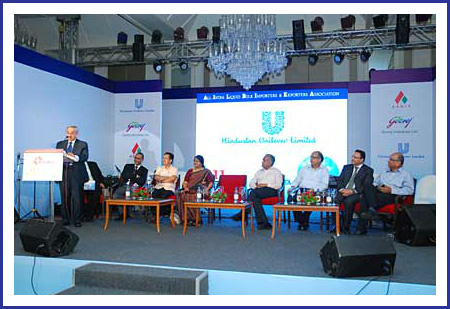


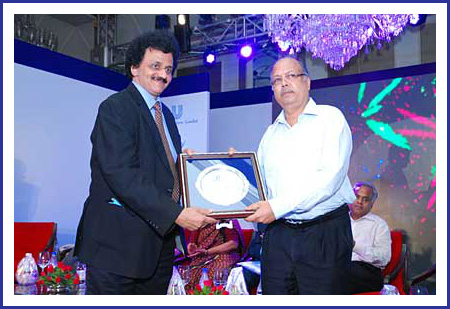
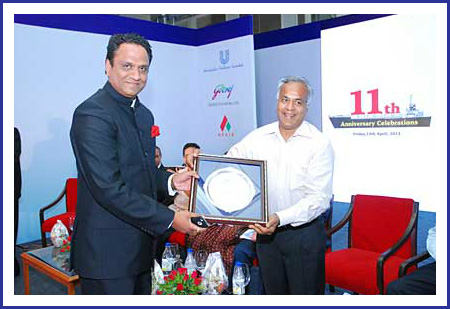
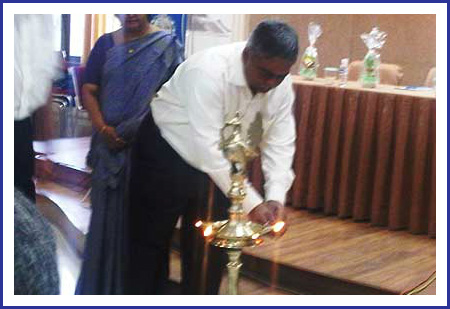
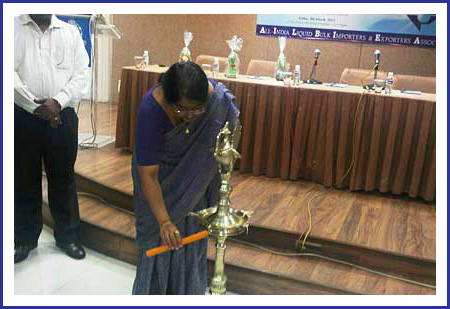
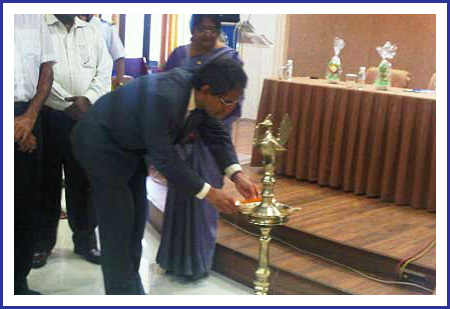
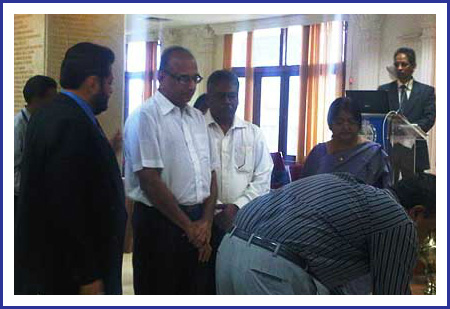
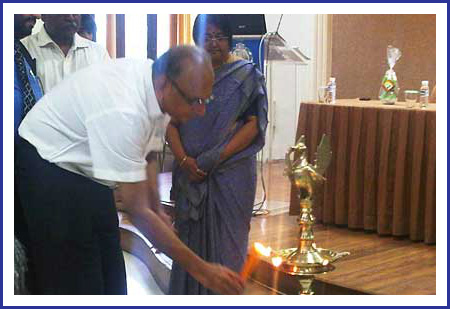

11th Anniversary
“Enthusiasm is the yeast that makes your hopes shine to the stars. Enthusiasm is the sparkle in your eyes, the swing in your gait, the grip of your hand, the irresistible surge of will and energy to execute your ideas.”
It is sheer enthusiasm and determination to contribute towards bettering our EXIM Trade, that is driving AILBIEA towards progress and success. As we step into the 11th year of an ongoing journey, we realize that we have a very long way to go ! The journey seems to be a long and challenging one.
This year, AILBIEA celebrates its 11th Anniversary, along with the Golden Jubilee of the Customs Act, 1962. Customs Act 1962 is a Bible / Gita / Quran for Customs and all connected to EXIM Trade. It is as much sacrosanct to Customs and Trade as the Bible / Gita / Quran is, to respective religious faiths.
There is historical evidence of imposition of import duty, during the medieval era. The development of organized taxation on imports and exports to its present form originated in 1786, when the Britishers formed the first Board of Revenue in Calcutta.
In 1808, a new Board of Trade was established. The provincial import duties were replaced by uniform Tariff Act through Customs Duties Act, 1859, which was made applicable in all territories of the country. The general rate of duty was 10%, which was subsequently revised to 7.5% in 1864. Several revisions in the Customs policy and tariff took place during subsequent years, though such revisions were mainly related to textile products. Sea Customs Act was passed by Government in 1878. Indian Tariff Act was passed in 1894. Air Customs having been covered under the India Aircrafts Act of 1911, the Land Customs Act was passed in 1924.
The Indian Customs Act, 1934 governed the Customs Tariff. After Independence, the Sea Customs Act and other allied enactments were repealed by a consolidating and amending legislation, entitled Customs Act 1962 (CA). Similarly, the Act of 1934 was repealed by Customs Tariff Act, 1975 (CTA).
Path-breaking legislations in the form of Self Assessment, On-site Post Clearance Audit and Authorized Economic Operator are gradually being initiated into EXIM trade and these legislations should help in fast facilitation and greater transparency.
The CBEC and the Mumbai Customs (Zone I, II and III) have held seminars and educative sessions on the above legislations, for the benefit of Trade. In fact, Customs are keen on educating and promoting these legislations to the Trade, to ensure that the trade is fully aware of the norms and the dos and donts, once these legislations become fully functional.
AILBIEA joined hands with the department and held a very informative and captivating Seminar on Self Assessment, On Site Post Clearance Audit and Date Quality, with the help of Mumbai Customs. Mr. S. K. Rahaman, Additional Commissioner of Customs, Mumbai, who has tremendous knowledge and has been in the thick of know-how of these legislations, was deputed by the Customs to address our members. Here again, despite much publicity and persuasion, response from the Trade was extremely poor.
I only hope that our members realize that one cannot build a reputation on what one is going to do. Unless there is great introspection and paradigm shift in attitude of our members towards being ‘partners’ in trade with the department, our Liquid Bulk EXIM Trade will get more and more slippery and fatal for their very existence. Unless the members realize the far-reaching ramifications and implications, along with tangible benefits accruing from these legislations, their operations will get into serious hurdles.
‘We must learn to live together as brothers or perish together as fools.’ Now, this is not what AILBIEA desires… we at AILBIEA always work towards living together as brothers, so as to never perish at all ! But there has to be reciprocation from members in extending their hands, too ! It cannot be one-way traffic all the way !
The general impression many members entertain is that being a member of any association is only to off-load their issues and problems on individual basis on the association and not in resolving trade issues and problems, which are actually the root cause of one’s individual issues. Or worse, some even become members just to satisfy some office bearers or just for the sake of membership !
There is need for complete overhauling in the approach and attitude of members towards the association and importantly, towards their inter-action with various departments (Customs, Port, Government and Municipal Corporation) through AILBIEA. All issues and problems can be resolved with a collective approach and the root cause of such issues can be ejected out of the systems, only by a holistic approach. This has been proved time and again by AILBIEA.
“If there is any one secret of success, it lies in the ability to get the other person’s point of view and see things from that person’s angle, as well as from your own.
If this is practiced by our members, I am confident that this world will be a happier place to live in.
I wish to sincerely thank all my colleagues for their unstinted support, unconditional help and the tremendous trust they have reposed in me over the years and all members who have helped our Association grow. I would like to bow before the great industrialist, Mr. Nadir B. Godrej, who has always been guiding, inspiring and motivating us, year after year. He has been a great source of strength and support to us. I wish to also acknowledge the unlimited support and guidance given by Mr. G. Chandrashekar, Editor, Business Line, in all activities of our association.
Friends, AILBIEA is the body and soul of Liquid Bulk Trade… and you, members, are the heart and driving force, to take AILBIEA to a very Superior Grade !
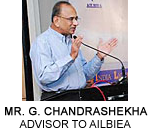
Towards faster, sustainable and more inclusive growth
As one of world’s fastest growing significant economies, India is currently a huge consumer of a wide range of Liquid Bulk Commodities covering Energy products (mainly crude), Food (edible vegetable oil) and many Chemicals. The trend of rising consumption is expected to continue into the foresee-able futures, as the economy is likely to register robust expansion. Current level of low per capita availability, combined with growing appetite for consumption, driven by rising incomes and population pressure would mean expanded demand for liquid bulk commodities.
Already the country’s dependence on imports of a variety of liquid bulk commodities is high. For instance, in case of crude oil, our import of an estimated 160 million tons represents over 75 percent of our annual consumption requirement. Similarly, in case of vegetable oil, our import dependence is to the tune of 50 percent with annual inflows totaling well over 8 million tons.
As import dependence rises, the need to improve the management of supply chain and logistics side assumes greater importance. Industrial houses and corporates dependent on liquid bulk cargoes for their business have to be a lot more focused on timing of imports, volumes, quality, border clearance procedure and so on.
Ports and Custom Houses form an integral part of liquid bulk supply chain, as it is mandatory that stipulated clearances are given by them. There is of course opportunity to improve the functioning of ports and customs houses. Document processing time can be reduced. Costs associated with Import activity – discharge, movement, storage, quality testing etc. – can be rationalised. In other words, there exists the possibility of saving time and cost.
This saving is critical simply because businesses are becoming increasingly competitive. In today’s world, it is not just survival of the fittest. It is the fittest and fastest who will survive. It is therefore imperative that the apex body of the country’s liquid bulk trade – All India Liquid Bulk Importers & Exporters Association – stays fully engaged with the customs and the port authorities, so that there is continual dialogue and coordinated problem solving.
Be that as it may, the industry and trade representatives on their part must complete their part of the obligation towards port and customs departments, by ensuring that appropriate documents are filed correctly and in time. If anything, it is more of teamwork between the importing entities, service providers and clearance departments (such as Port and Customs).
The country has now embarked on the Twelfth Five Year Plan (2012-2017). We need to register robust GDP growth in a sustained manner. Agriculture, Industry and Service sectors have to contribute in tandem and significantly, to sustain high levels of growth rate, say 8 to 9% per annum. Global conditions are sure to pose enormous challenges going forward. Geo-political tensions, sovereign debt crisis, rising crude prices, currency debasement, speculative capital, inflation and other factors are sure to act as speed breakers.
The basic objective of the 12th FYP is Faster, More Inclusive and Sustainable Growth. According to the Planning Commission, Energy, Water and Environment will present major sectoral challenges. Creation of world class infrastructure is another objective. But can we find resources to create it ?
It has been recognised that commercial energy demand will increase at 7% p.a., if GDP grows at 9% p.a. This will require a major supply side response and also demand management. Additionally, energy pricing is a major issue. Petroleum prices are significantly below world prices and world prices are unlikely to soften.
For Agriculture, the approach paper says, target at least 4% growth. In the 11th FYP, actual growth fell short of the target of 4% growth. If we have to achieve agriculture growth rate of not less than 4%, we should not follow the same plans and strategies of the previous Plan period, which failed to deliver. We need to rethink our strategies, including resource needs – financial, human and technological. Land and water are critical constraints. Technology must focus on land productivity and water use efficiency.
I believe the 12th FYP period will generate extraordinary opportunities for the country to deliver growth benefits more equitably. All the three sectors – Agriculture, Manufacturing and Services – have to perform well in tandem, so that enough incomes are generated and distributed inclusively.

Once again, it's AILBIEA time ! Poem by Nadir Godrej
Once again it's AILBIEA time
I thought I should refrain.
But Jayyannt wants a speech in rhyme
So I must wrack my brain.
Last year I tried to wriggle out
But Jayyannt lobbied hard.
Tenth anniversary no doubt
Was his winning card.
This year the dates just wouldn't match
I thought I could drop out.
But Jayyannt always has a catch
This year it was about
The Golden Jubilee no less.
“Of what?” you might well ask.
But Jayyannt as you surely guess
is quite up to this task.
“The Customs Act of '62”
He proudly did declare.
For folks like me, who hardly knew
Expertly he did share,
“This act for us is a holy book
For it lays down the law.
For certainly it's here, we look
And from it we can draw
All inferences that we need
To represent our case.”
And his advice we should heed
So all of us should raise
A toast to the Customs Act
And its fifty years,
We salute this noble tract
With heartiest of cheers!
But even more we now salute
The changes they have made.
Once their rule was absolute
And what they said, we paid.
But self assessment's now the way
We now enjoy their trust.
And on this very joyous day
I think we really must
Thank customs folks for all they've done
To keep the trade in flow.
And all our hearts they've surely won
For such a perfect show!
Once customs were investigators
Now they deserve our plaudits.
For they are now facilitators
With their post clearance audits.
The day will come when trade is free,
For us that would be nice.
And zero duties is what we'd see
But there'd still be excise,
Unless of course, then GST
Sees the light of day.
All of us collectively
Need to find a way.
This tax is good, this tax is fair,
As fair as tax can be.
The government can get its share
While growing the economy.
Our trade is now in deficit,
Might stay that way for long.
Our export target we should hit
But much is going wrong,
The ports are good but roads are bad
And theft is on the rise.
I think it would be very sad
lf no one ever tries
To pave the road and catch the thief.
Unless we find a way
All our trade will come to grief.
And I would like to say
The abolishment of all Octroi
Has been an old refrain.
This ancient tax does annoy
And produces little gain
Now ideally it should be scrapped
But if it does survive,
At two percent it should be capped.
For industry to thrive
On raw materials keep it nil
So factories don't close.
On finished products keep it still.
Let's plead in verse and prose!
Now liquid trade is mostly oil.
It may be sourced from rock
Or from some plants that grow in soil.
And we should all take stock,
Our economy does need them both
To run machines and men.
Without them both we can't have growth
And so it's obvious then.
All of us must help the flow
And every time we meet
We can help our nation grow
And that is AILBIEA's feat.
